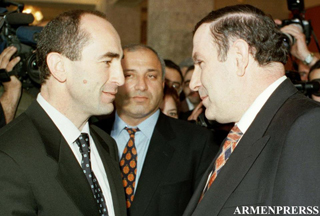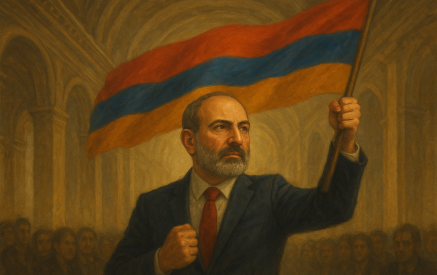On February of 1998, when Levon Ter-Petrosyan, in his farewell and resignation speech address to us, mentioned “the forces known to you”, under it we thought of not an external force, but Kocharyan and his like-minded people, and when in the same farewell and resignation speech, Ter-Petrosyan made the expression of a “war party”, all of us thought of Dashnaktsutyun. It is very likely that the “war party” is the very Dashnaktsutyun. In other words, the ANC, led by the first president, today, at this moment, is intended to cooperate with the “war party” for the sake of justice.
This completely fits into the context of modern notion of “politological analysis”, and if one day, all of a sudden, Ter-Petrosyan decides personally to put Robert Kocharyan into politological analysis, we would not be much surprised. We would not be surprised, as we have already begun to realize that Ter-Petrosyan is not so much pro-Western, as it has continually seemed to us.Typically, when our politicians are asked whether they are pro-Western or pro-Russian, our politicians without thinking long are answering, “I’m a pro-Armenian”. This is the easiest and the most profitable option to refrain from the questions and answers, especially for our politicians, who, apparently, do not know themselves whether they are pro-Western or pro-Russian. Anyway, let’s go back to Levon Ter-Petrosyan, more precisely, to Levon Ter-Petrosyan and ANC, and further precisely, Levon Ter-Petrosyan’s being pro-Western and pro-Russian, which, now and then, replace each other in the context of “there are no permanent friends and permanent enemies; there are interests”, and although this context was more chanted from Vazgen Manukyan’s mouth, and, actually and in reality, it was applied and used by the very first president, and, in fact, the successful and timely announced cease-fire was entirely the positive result of it, and during those times we were not even thinking of whether we are pro-Western or pro-Russian.
Because during those times we did not even have time to think about such things, and if we had time to think about something, we were thinking mainly about Karabakh, and thinking about the Karabakh issue, our being pro-Western and pro-Russian were generating from these issues, and they were not hindering each other, they were in peace and harmony side-by-side, like Russia and the West with their relatively peaceful coexistence, and now, when the relations between Russia and the West are aggravated to the maximum, the issue of pro-Russian and pro-Western of our politicians re-emerged in Armenia and moved to the first plan, and the same issue in the same way is brought forward before our authorities, and the blissful and complimentary times seem to be left in the past, when it was possible to be good with almost everyone without being accountable to anyone, moreover, we are ungrateful to this-or-that person and demand them to recognize the independence of Karabakh and the Armenian Genocide.
Although Oskanyan was speaking about complementary, on and without the occasion, actually our complementary had a real life in the first few years of Armenia’s independence, and today’s events indicate that our complementary is possible only under peaceful coexistence of Russia and the West.
Voskan YEREVANTSY

























































